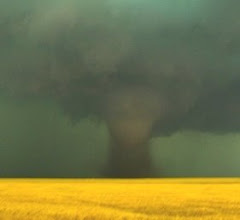In the late summer/fall of 1976, I had graduated with my doctorate and was working at the National Severe Storms Forecast Center (an earlier incarnation of what is now the Storm Prediction Center), in Kansas City, MO. A colleague was on a late summer vacation in the Colorado Rockies, when on 31 July, the Big Thompson Canyon in Colorado was swept by a flash flood that killed 143 people. My friend escaped and returned home safely, but a post-event investigation revealed it had not been well-forecast.
After the Big Thompson debacle, the National Weather Service instituted a Flash Flood Forecasting Course (FFFC) at the NWS Training Center, taught by Drs. R. A. Maddox and C. F. Chappell, who had studied the Big Thompson event, as well as many others. Their established expertise in flash flood events made them logical instructor choices. In the fall of 1982, I transferred from NSSFC to the Weather Research Program in Boulder, CO, with Dr. Maddox as my boss. I was reluctant at first to get involved with the FFFC but eventually complied with his request, mainly because he was being swamped with duties. I eventually came to embrace the course and its goals - our participation was for only 2 days out of a 2-week course, but since it focused on basic principles and application of them to forecasting, it was a great way to learn how to do effective forecaster training. Dr. Maddox was a great instructor and, while I had to do things to match my ways, I openly copied many things I saw him doing, because they made perfect sense. I'm still training forecasters in short courses the same way.
I learned many things about flash floods during the years spent teaching the FFFC (which eventually was discontinued), and on the occasion of the 20th Anniversary of the Big Thompson event, a symposium was held in Fort Collins, CO, that included a tour of the canyon. The tour was a very humbling and sobering experience, and it gave me a great deal of respect for the massive power of moving water. And added a powerful sense of urgency to my training lectures. Since then, I continue to be troubled by our society's collective inability to grasp the significance of flash floods at a personal level. Whereas tornadoes are relatively exotic and scary, everyone has experienced heavy rainfalls and modest flooding, so it seems that many have no respect for what moving water can do when the rainfall is sustained and the flooding becomes massive. We've made some progress since that fateful day in 1976, but we have a way to go, yet. Communities need to plan for high-intensity flash floods, such as what to do when roads are washed away and power is disrupted by the floods. Regulations need to be developed and enforced to mitigate factors that serve to increase the threat, such as washed-away propane tanks. Building on floodplains should be forbidden. And so on. We are not yet a 'weather ready' nation - not even close!!
One thing was clear at the 20th Anniversary Symposium: the Big Thompson Canyon flood was not a "freak" event. Something of the sort happens nearly every year somewhere in the high terrain of the western USA, differing only in the magnitude of the event. People in the know have been saying for decades that Boulder, CO was long overdue for a big event ... and this year, the time had come. Although not the same in detail as the 1976 Big Thompson flood, the ingredients were there for an event and it has come to pass with devastating effects. As I write this, there are more than 1200 people yet unaccounted for well after the floods, and at least 5 known fatalities.
This event was foreseen decades ago - although it wasn't known precisely when and how it would happen, of course - but people this week are saying things like "We've never seen anything like this! We had no idea things could get this bad here!" This betrays a significant shortfall in our communication of risk to the public. No one should be so ignorant as to believe that what they've seen in their short lives is the worst the planet can produce. No one should be so ignorant of the illusory nature of their security when confronted by the forces of the natural world. As I write this shortly after the 2013 CO floods, it's virtually inevitable that an event much worse than anything yet recorded in all of human history will happen someday, somewhere. What is written in that history shows that major damaging events have happened in the past, and the lesson to be learned is they will happen again, and might well be even more devastating than anything we've experienced before! It's not 'scare tactics' to convey an accurate risk assessment. We owe the public an accurate understanding of the threats they might have to confront. Evidently, we have yet to accomplish that.
Just Past Peak Upper Elevation Snowpack
11 hours ago


No comments:
Post a Comment